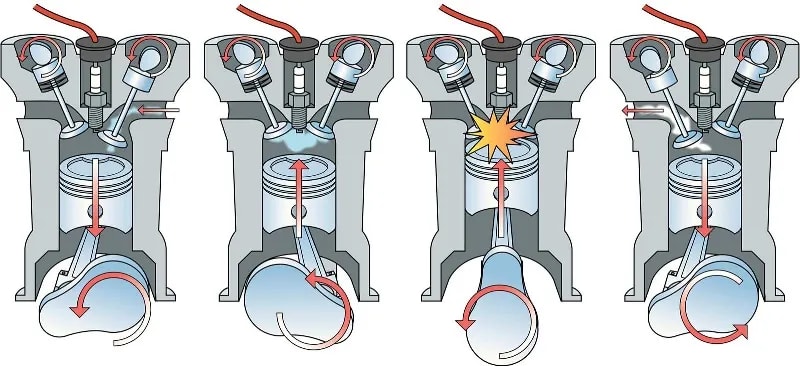How to Create Your Automotive Mechanic Resume: Examples and Tips
Are you wondering what information to include in your auto mechanic resume? Learn what employers look for here.
There are a lot of moving parts in a car’s engine. From the crankshaft and camshaft to the pistons, rods and pulleys, all these components are moving quickly and at specific times so systems can function properly.
During this process, your car’s engine utilizes four distinct piston strokes in order to run effectively. There are four steps involved: intake, compression, power and exhaust. A car’s ignition timing comes into play during the compression stroke. Ignition timing controls when the spark plug fires during this process.
Ignition timing is an important process that plays a big role in the performance of an engine. So, it makes sense that there would be ways to affect the ignition timing process to increase vehicle performance. The best way to maximize engine performance is through advancing or retarding ignition timing.
If you’re interested in finding out more about ignition timing, how it works, and how you can modify it to affect the performance of a vehicle, then keep on reading.
Ignition timing is an important process when it comes to running an engine. If the spark plug fires too soon or too late during the compression stroke, damage to the engine can occur over time.

During the process, the following steps occur:
After the ignition timing process, the exhaust stroke occurs to release the old gases so the process can happen again. The timing of the spark is extremely important to maintain high engine performance.
A range of factors can influence the ignition timing in an engine, including the condition of the spark plugs, the temperature of the engine and the intake pressure. Changes or upgrades to an engine will require subsequent changes to the ignition timing settings.
Ignition timing is measured in degrees of a crankshaft rotation before top dead center (BTDC). Spark plugs need to fire at the right time, which can be achieved by advancing or retarding the timing of the engine.
Timing advance means that the spark plugs are firing earlier in the compression stroke, farther from TDC. The air and fuel mixture in the combustion chamber doesn’t burn right away. Ignition timing advancing might be needed to allow time to get everything ignited.
The major benefit of advancing the timing of a vehicle’s ignition is increasing the horsepower of an engine. Advancing the ignition timing helps raise the high-end power while reducing the low end. It also helps get the spark past the ignition delay and run at peak power.
Retard timing causes the spark plug to fire later in the compression stroke. The effects of retarding ignition timing include reducing engine detonation, which is combustion inside the cylinders after the spark plug fires. This is also known as engine knocking.
When it comes to turbocharged or supercharged engines that are running at higher levels of pressure, retarding the timing of an engine can be more beneficial. Retarding the timing on these kinds of engines helps compensate for denser air and fuel mixtures and allows them to run more efficiently.
It’s important to consult your owner’s manual for the details of your specific engine before determining what can be adjusted with the ignition timing.
When it comes to modern engines or engines without modifications, ignition timing is typically controlled by the engine computer. It will advance or retard depending on a range of factors to keep your engine running smoothly.

For engines with symptoms of incorrect, or off, distributor timing, you can make manual adjustments fairly easily but will want to have a background of knowledge and the right equipment first. You can also consult with a repair shop to ensure the procedure is done correctly.
If you’re wondering how to tell if timing is off on an engine, there are several performance issues that can occur. It’s important to pay attention to these signs so you are able to make adjustments or get your car looked at sooner rather than later.
Problems can occur even if the timing is only slightly off in one direction or the other. Some incorrect timing symptoms include:
These are just a few things you can look out for when it comes to ignition timing and performance that will allow you to be proactive in maintaining your vehicle.
Advancing ignition timing can have the effect of improved low-end torque, making the engine feel more responsive. Proper timing also contributes to smooth engine operation. When the ignition timing is optimized, the air-fuel mixture is igniting at the perfect moment, which can improve combustion and therefore increase fuel efficiency.
Some incorrect timing symptoms can include engine knocking or pinging, a loss of power or acceleration, decreased fuel economy, an overheating engine or rough idle.
Several things can cause issues with the ignition timing being late. Sometimes, it may be as simple as the timing being set incorrectly during maintenance or repair work. Other factors may be worn-out timing components, a faulty timing sensor or even vacuum leaks.
If figuring out how things work under the hood of a car is something that interests you, you can prepare for a career doing something you’re passionate about with training from Universal Technical Institute (UTI).1
Our Automotive Technology program will give you the hands-on training you need to be able to diagnose, maintain, and repair a range of systems — including the ignition system.18 Specifically, the Power & Performance II course builds on knowledge when it comes to timing and engine performance so you can learn how to fix late ignition timing.37
You can graduate from the program in less than a year with the education needed to enter the workforce.7 Find out more about the program by requesting information here.
Universal Technical Institute of Illinois, Inc. is approved by the Division of Private Business and Vocational Schools of the Illinois Board of Higher Education.